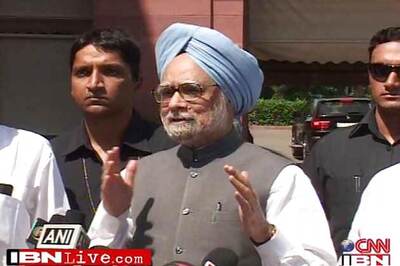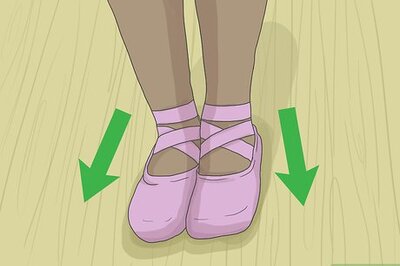
views
New Delhi: When Nidhish Anand, a Dalit jeweller in Delhi, was about to enter a partnership with a Brahmin businessman, Anjani Kumar Pathak, a disclosure preceded the terms of agreement. “But I am a Dalit," Anand had said before any progress was made in taking the brief meeting to further levels. The revelation was more an alert than a candid chat over personal details.
They first met amid the din and glitz of India International Jewellery Show in Mumbai in 2012.
He emphasised his identity as he did not want the ties to fray in future due to caste prejudices. “There was no point hiding my identity," he said. They were planning to work together, and certainly Anand didn’t want his identity to become an issue in later stages of work.
“I was wary of the fact that what if Pathak was told by others that I am a Dalit and what if he thinks of his snapping ties thereafter," the jeweller said.
The partnership that started in 2012 has resulted in working on establishing a manufacturing unit in Jaipur for the 24k jewellery. The two together frequent China for the same, and Pathak said, “His caste doesn’t matter to me, maybe because of the social values inculcated in me through my schooling in Sainik."
Even though Dalit entrepreneurs have come a long way in asserting their presence in the field, what is yet to be seen is the fading away of prejudices attached to the identity of being a Dalit. The Supreme Court recently ruled that the creamy layer in SC/STs needs to be defined – but economics was never the determinant of their rights, historical and social wrongs were.
The Dalit entrepreneurs spoke to News 18.com and expressed that it was not the right time to define creamy layer. “We are still viewed to be good plumbers, electricians, contractors. Not owners of a 500-crore company," said a Dalit entrepreneur in an interview.
What’s in a Surname?
Anand said that he didn’t directly face any discrimination, even if he was making a foray in the field like jewellery which gets tough for the other privileged sections. This, he believes is because of the way he presents himself.
“Just see the way I look. Who would think that someone wearing a tie, suit, dressed in a certain manner, conversant in English would be a Dalit? There are some surnames that reveal identities but mine - Anand - does not suggest that I am from a Dalit community," the Delhi jeweller said.
His looks and his surname don’t go with his identity, he believes, which spares him any direct prejudice. But that doesn’t mean he is insulated from viewing prejudices.
There are businessmen from other castes who indulge in ridiculing the Dalit entrepreneurs in front of him, and they do it with liberty as they don’t know about his identity. “They don’t know I am a Dalit so they talk and expose their biases. I see their frustration over the deals they strike from people belonging to the SC community. Their wish is either the deal materialises quickly or ends as soon as possible so that no frequent contact is required further," said Anand.
Where Anand’s surname is a respite, Kamble’s is biography in itself. Santosh Kamble, born in a Dalit family in Mumbai, is a managing director of Bizcraft bags and Mumbai president for Dalit Indian Chamber of Commerce & Industry (DICCI).
“In Maharashtra, if you have the ‘Kamble’ surname, everyone can make out that you are a Dalit," Kamble said.
He became an entrepreneur “under certain circumstances and not by choice". He spent his childhood with two sisters, a brother, mother and father in a two-room residence in Chira Bazaar Chawl in South Mumbai. His father made shopping bags for clients on a contract-basis, running the operation from their already cramped home. His home was a so-called factory, where they had three sewing machines and two rooms; one 10 feet by 15 feet and the other 15 feet by 15 feet.
When Kamble was 12, his father got a big order of 5,000 pouches through a mediator for McDowell’s, a popular whiskey brand. The order would have fetched them Rs 35,000 to 40,000, a generous amount for that time. His father had put everything into the order and started working. But the mediator never turned up to collect the order. “We had 5,000 pouches lying at our home, with no takers. We were in a big financial crisis," Kamble said. “I was in class five then and decided to sell the pouches somehow."
Every day after school, Kamble took 30 to 40 pouches and went to Marine Lines local train station, where he tried to hawk them off. “I sold about 10, 15 pouches every day, earning around Rs 10 for each. It wasn’t much, but it was something," said Kamble.
Selling on the streets wasn’t his choice, but that is how he started. At the age of 12, he learnt how to tackle the police, other hawkers and street thieves. It was a terrible situation, but I learnt how to negotiate it. That was his first business lesson.
Kamble couldn’t sell all 5,000 pouches, but he became an entrepreneur. His first brush with business prepared him for the challenges that were yet to come. He has a turnover of Rs seven crore and wants his business to grow further and manufacture bags for laptop companies. He wants to become 500-crore company by 2030.
“Today I have a network of 600 sewing machines in Mumbai. I’m planning to start a 120-machine factory in Bhiwandi and later expand it to a 500-machine manufacturing unit and make bags for VIP, Samsonite, HP and Dell," Kamble said.
“It is not easy starting your own business, especially if you are a Dalit. Some people think we can only become electricians, plumbers, contractors. Not owners of a 500-crore company," he said.
The Dilemma of DICCI
According to Kamble, aspiring Scheduled Caste entrepreneurs face the ‘Three M’ challenge: market, money and management. “Dalit entrepreneurs don’t have access to market. It’s difficult for us to get in because of various eligibility criteria," Kamble said.
When it comes to money, Kamble says it is difficult for Dalits to get loans from banks. “In India, the banking system is collateral-based. Being from Dalit community, we don’t have assets, so giving mortgage to bank is next to impossible," he said. And even if one does start their business, they don’t have the management skills to grow.
For them, DICCI takes care of these challenges. The Dalit commerce chamber, through affirmative action, reservations in public procurement, vendor diversity, financial inclusion and various bank loans schemes made the market more accessible for an aspiring Dalit entrepreneur.
Kamble was introduced to DICCI five years ago and he liked the concept of helping other entrepreneurs from the community. Today, he is the president of Mumbai chapter of the organisation and helps young entrepreneurs navigate the same challenges he faced when he was starting out.
“DICCI’s message is that we can do business and prosper. We are not just job seekers, we are job givers. You can fight your caste through capital. I am a strong believer of that. The most important empowerment is economic empowerment. If that happens, all my brothers and sisters are capable of doing wonders," he said.
Though DICCI takes care of many things – at one point being associated with it led to loss of business for some. In the DICCI meetings, the Dalit entrepreneurs expressed that sometimes being associated with the Dalit chamber can lead to social boycott by other businessmen.
Manoj Kumar, a first generation businessman from his family, said that the Direct Selling business is hard. It is a lot of legwork, meeting people and making connections. “It is harder still if you are a Dalit," said Kumar, who is the chairman of Uniayur and MNH Healthcare Private Limited, a direct selling companyfocused on Ayurvedic and alternative medicine.
Dalit Indian Chamber of Commerce & Industry (DICCI) Has Helped with Capital
Kumar, himself the Delhi president of DICCI, is now helping other young Dalit entrepreneurs to navigate the same challenges he faced. It’s only because of DICCI they are signing MOUs and our projects are getting financed.
But two years ago, when Kumar announced on social media that he was joining DICCI, many who worked with him got to know his caste and left. There was an upside too. “There were people who left me because of my Dalit background and went and opened their companies. On the flip side, many people from my community got to know that it’s ‘our company’ so they came and joined me," he said.
And he found a committed lot. “Earlier I had to convince people to come to work for me. Now that’s not needed. 80 percent come ready to work, thinking, it’s their company too," Kumar said.
Beating Stigma Membership of DICCI Grows
There was the negative perception attached to DICCI but after 2011 expo at BKC Mumbai corporate people joined DICCI dais assuring affirmative action and buying their services and products. That’s when association with DICCI started to be seen differently. Milind Kamble head of DICCI told News 18.com that to deal with the negative effects of joining DICCI, the agency “created complete policy support as a result people openly joined us," said Kamble.
In 2011, DICCI organized a trade fair at Mumbai’s BKC where 50 noted industrialists participated, including heads of financial institutions. This event got national and international publicity, and following it membership in DICCI saw a surge.
Ten members were associated with DICCI when it is formed in 2005. In 2011, almost 2,500 members joined, and after the event there was a rise of 1,500 members.
In 2012-13, the number increased from 2,900 to 3,400. In 2014, there were 3,700 members from Dalit community; there were 4,000 members in the year 2015. In 2016 there were 6,500 Dalit entrepreneurs and the next year it rose to 8,070.
Entrepreneurs with minimum annual turnover of Rs 10 lakhs onwards can become members. Start-up also becomes member of DICCI. But have to get their company registered. They take domain experts on advisory board.
The numbers kept steadily increasing every year since, with a big surge in the last three years especially. DICCI now in 2018 has about 10,200 members and it continues to grow.




















Comments
0 comment